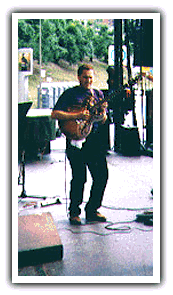In my years of study as a musician and composer, I have made an ongoing commitment to seek out role models who have respected the jazz tradition but also were not afraid of it. These mentors, whom I have come to know through their recorded body of work, include Wayne Shorter, Thelonious Monk, Charles Mingus, and Ornette Coleman. From each of these giants I have learned lessons that continue to nurture my love of improvisation and the creation of unique compositional structures to challenge and ignite my fellow musicians' imaginations. Thus, I have created this set of goals as a mission statement which guides me as a jazz composer and musician:

1. To realize that jazz is a continuum.
The accomplishments of previous composers are to be emulated not copied. Jazz is a music ever-evolving and in flux whose beauty lies in its unique ability to allow the composer to discover his/her own voice through practical experience.
2. To seek to understand music outside the jazz idiom.
The great composers have effectively used jazz as a filter to focus their many influences into a unique language full of unexpected possibilities. Ornette Coleman personalized his conception through the blues. Shorter studied mythology and Brazilian music to create the masterful Native Dancer. Monk manipulated pop tunes like Lady, Be Good and Just You, Just Me into gems of his own. And Mingus was deeply aware of the power of orchestration and color from his study of classical masters and Ellington.
3. To strike a balance between individual improvisation and a group sound.
I strive to create settings in which my conception is preserved but the performer is able to create freely around and in conjunction with my composition. Too often jazz composition becomes another tired soloing vehicle or a straight-jacket of written notes that serves to inhibit creativity. I hope to take the middle path.
4. To understand that jazz is not a style but a lifestyle.
Composition cannot be learned in the classroom. The compelling compositions of my heroes were created from their improvisations and life experiences. Creation requires a daily commitment of risk-taking and the ability to learn and, in some cases, bask in one's mistakes. I can think of no greater example than the music of Charles Mingus. The raunchiness of the blues is so often juxtaposed against the stark beauty of his harmonies. This deepest of knowledge is not available from books.
CONCLUSION
If I can contribute in some way to this incredible, evolving legacy labeled jazz, then I will be satisfied. I feel that I am a small yet vital link in an ongoing relay race. Nothing makes me feel better than performing my music to an attentive and inquisitive audience. Rather than lose the audience, I seek to engage them and present a wide palette of colors and emotion. If I keep my daily commitment to this music then I will be rewarded, perhaps in totally unexpected ways. Rather than sway to prevailing tastes and opinions, I will continue to chart my own path with my mentors as beacons of light. If I do this, with all sincerity, then I cannot fail.